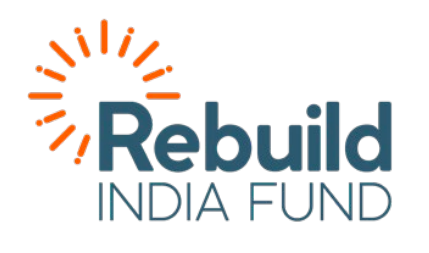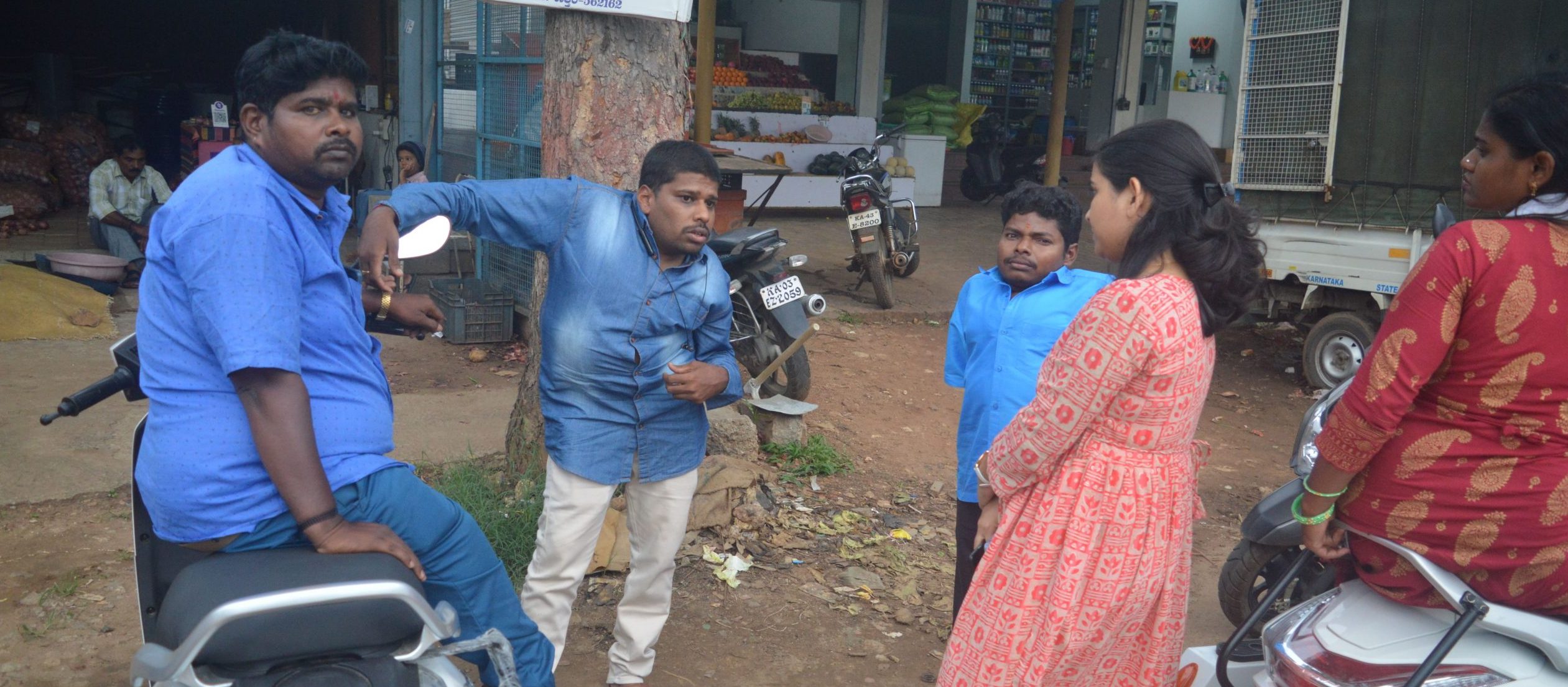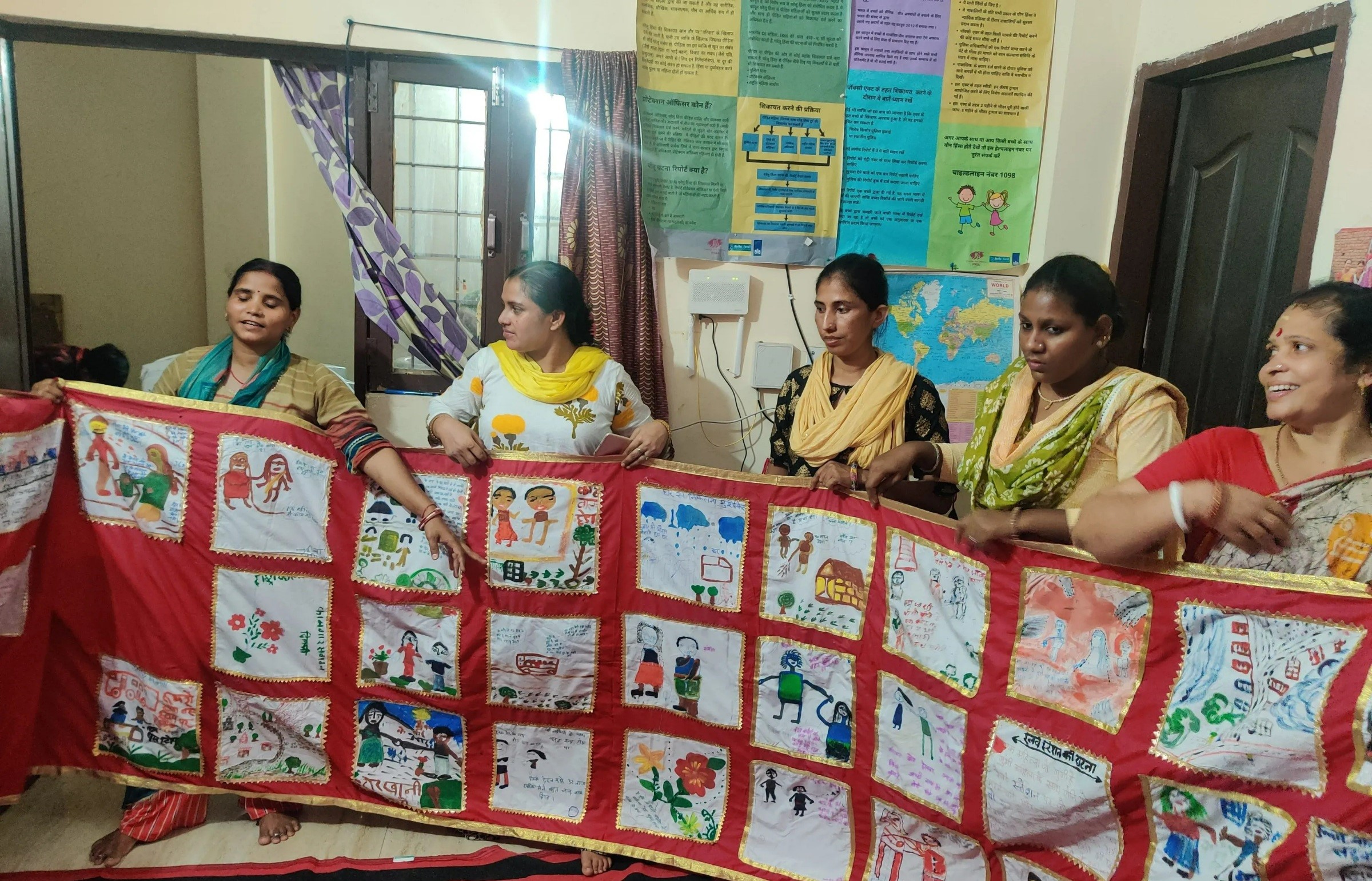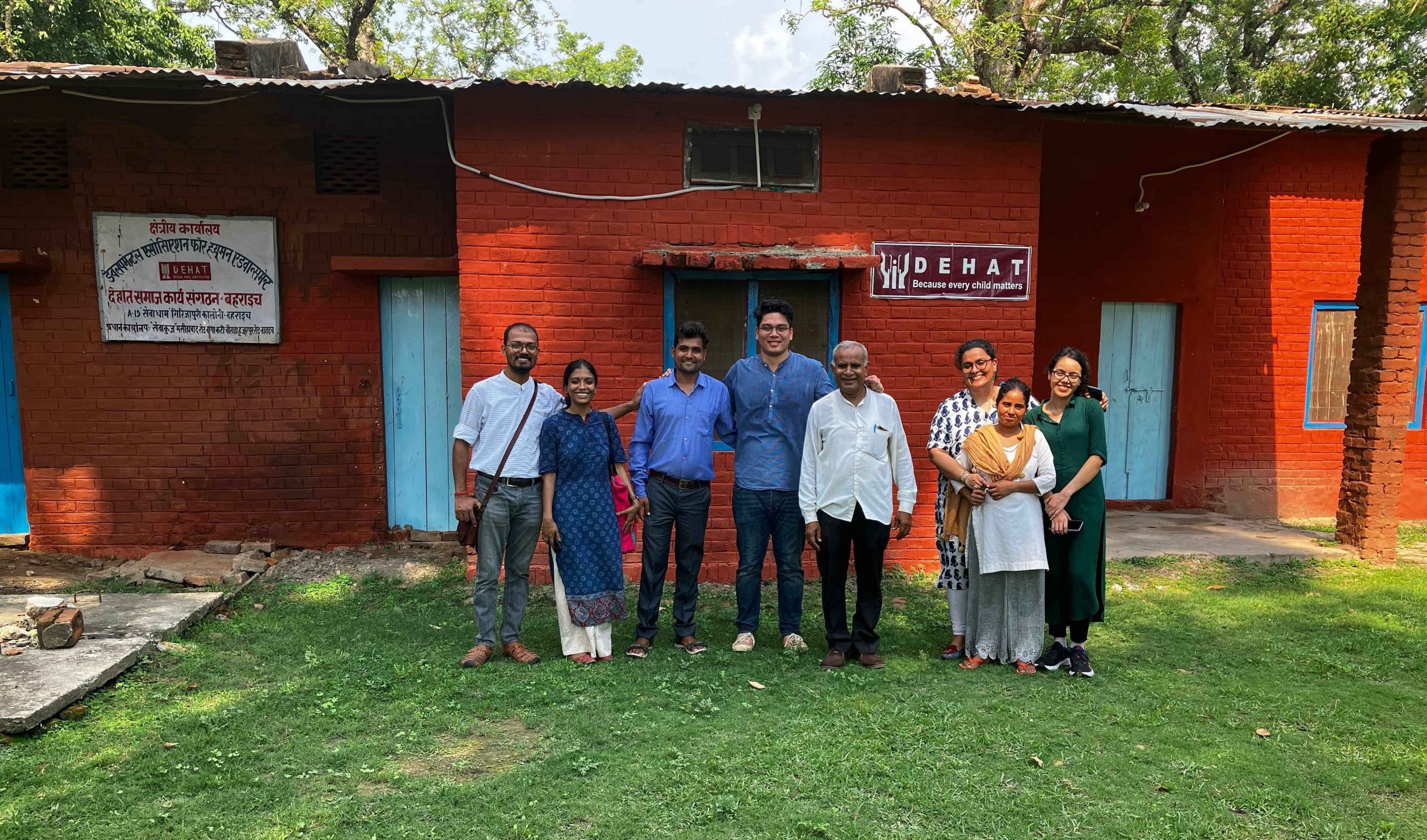Field Note: Voice for Needy Foundation
Two of us from the Rebuild India team, Shinjini and Sangeeta, embarked on a journey to understand the challenges and experiences of individuals living with disabilities through the lens of one of our partner NGOs
– Voice for Needy Foundation (VNF). VNF empowers a diverse spectrum of Persons with Disabilities (PWDs) across urban and rural Bengaluru. It has interventions that holistically covers the challenges faced across the life of a person with disability- from early diagnosis, care and rehabilitation to increasing agency by bridging the access to education and rights to ultimately finding self-dependence through dignified livelihoods.
Guiding us through this journey was Arun Kumar- the founder of VNF and the driving force of its vision. Arun, a On this journey, we were joined by several VNF staff members, including board members, many of whom were also new to the learning experience.
Part I: Early Intervention, Care and Rehabilitation
“Why is it that I’ve only seen members of the Voice For Needy Foundation visiting me for the past three years? Why haven’t any government healthcare professionals or local panchayat representatives reached out to assist me or even engage in a conversation?” says the mother of Lakshmi (name changed), a young girl of 4.5 years of age, as she gently places her daughter in a chair and cradles her head to prevent it from rolling. It’s evident that Lakshmi is facing significant challenges, she is battling cerebral palsy1, which has affected her motor skills and diminished her reflexes. There are also signs of secondary deformities emerging in her limbs, trunk, and neck due to her limited mobility. The mother excuses herself momentarily as her child requires some care and assistance with her involuntary micturition2.
Earlier in the day, Arun had stressed the importance of early detection of disabilities in infants. This is crucial to prevent the development of secondary deformities as the infants grow up. VNF builds the capacity of Auxiliary Nurse Midwives (ANMs)3, by training them to scan signs of disability early and during delivery. He shared two such vital tell-tale signs:
- crying pattern of the child.
- eye contact of the child made with its mother/carer.
In cases where these indicators are absent or raise suspicion, the ANMs are encouraged to bring the children to the local care centre established by VNF.
Reflecting on his own experiences, Arun pointed out the neglect that healthcare professionals display towards the issue of physical and intellectual disabilities. When a disability is identified, parents are frequently offered false assurances, they are told that “it will improve with time.” Unfortunately, this misguided advice often results in parents not taking proactive steps to address the issue, ultimately causing the child’s condition to deteriorate. It is this very mindset that VNF tries to fight as they train the parents on the care and rehabilitation required for their children. This is done through an extensive program that supports physiotherapy, counselling sessions, and peer interactions and builds a positive environment for future possibilities.
To better understand the rehabilitation support provided by VNF, we met a 7-year-old girl, Charu (name changed). As we stepped into her family’s living quarters, the space seemed to shrink further with the added presence of several individuals. Amidst it all, Charu lay on a mat. Concerned about the potential stress that so many people might bring to Charu, we shared our worries with Arun and her mother. To our surprise, the mother and Arun shared that Charu enjoyed the company and being around people delighted her. The mother further shared that through her continued physiotherapy, rehabilitation training sessions and support equipment provided by VNF, Charu has made significant progress. She has gained control over her torso, improving movements and more precise speech, even if it’s in a few words. Charu now communicates her needs, signalling when she’s hungry or needs to use the toilet. Charu’s mother shares that their goal through these physiotherapy sessions is ultimately for Charu to sit independently. This milestone itself is enough for them.
Figure 1 (Left) The Wheelchair used by Charu has customised modifications to her needs. They are built according to the size of the trunk and her neck to support her posture. It also has a provision for a headrest and a footrest. This wheelchair can be easily modified to different sizes by adjusting the screw sizes and therefore grows along with Charu. (Right) The splint serves the purpose of securing Charu’s foot in place and offering support when she stands.
What lies ahead of therapy? How does it impact the quality of life for both Charu and Lakshmi?
The first step towards this is education. Charu’s mother is wary of sending her to school. She says that although Charu sits quietly in the classroom, all the students’ attention is always focused on her, discouraging her from sending her to school. This sentiment also resonated with Lakshmi’s mother. In such cases, VNF counsels parents to gradually increase the time their child spends at school, reassuring them that after a week or so, the other children will become more accustomed to having a child with a disability in their midst. VNF also explains their proactive measures to sensitize teachers and school staff to work with disabled children effectively. They strongly encourage parents to enrol their children in government schools, where accessibility modifications have been made to create a more inclusive school environment.
We visited one such local government primary school in Hesarghatta village, which serves as a model school of disabled-friendly infrastructure in Hesarghatta. In this school, they have implemented simple modifications, including:
- Sloped entrances and exits to accommodate wheelchairs and give complete access to the entire school space.
- Railings for additional support.
- Disability-friendly toilets with appropriate signs in both English and Kannada languages.
Take a look at the infrastructure here and here.
Currently, 8 disabled children benefit from these modifications out of 150 students in the school. This school is considered a model institution, and VNF’s modification efforts will be replicated in five more schools through a government partnership. VNF has made inclusive infrastructure across Hesarghatta village, in colleges and local vote polling booths.
Based on his past experiences, Arun has seen that with continuous support, children such as Charu can achieve successful careers, including dignified employment in multinational corporations, bringing us to VNF’s second intervention area, which is identifying livelihood opportunities for PWDs.
Part II: Livelihoods
VNF has two employment programs: one for young individuals aiming for wage employment and another for individuals aged 35 and above, emphasizing self-employment and entrepreneurship development.
In their wage employment model, VNF’s program coordinator, Irappa, plays a pivotal role in contacting job fairs. He focuses on raising awareness among organizations about the contributions of disabled individuals in the workforce. When HR representatives express concerns or questions regarding how disabled individuals can be integrated into their workforce, Irappa uses visual aids such as photos and videos to showcase people with disabilities successfully performing various job roles. If companies encounter any challenges in this regard, they reach out to Irappa for additional guidance and support.
Arun explains that typically corporates hire individuals on a contract basis, while retail companies hire disabled individuals as employees. VNF’s average turnaround time of placing 100 disabled individuals in jobs is only 30 days. As of today, VNF has placed over 900 PWDs across corporations and retail chains in urban Bengaluru such as Big Basket, WeWork, Sheela Group, Mitti Cafe, and Hatti Kaapi.
Arun shared some learnings from the journey that has led VNF to deploy this model with high rates of success:
- Customising employment opportunities: In its early years, VNF matched the unique capabilities of disabled individuals with job opportunities and provided field visits to prospective employers to understand their concerns better.
- Networking is Crucial: Arun’s efforts to expand his personal network of individuals, as well as other PWD networks like Mobility India and Enable India, played a crucial role in onboarding corporate connections.
- Leveraging Funders: VNF focused on securing job placements rather than seeking monetary contributions when approaching funders and companies, resulting in many donors also becoming employers themselves.
- Leveraging GEDI Hiring Practices: Different companies have varying hiring practices, and many of them have reservations about the inclusion of PWDs, which VNF effectively leverages.
- Setting Wage Standards: VNF established a minimum wage expectation of INR 13,000 with its employee partners, particularly for candidates coming from distant locations, ensuring fair compensation.
- Effective Training for Candidates: Training disabled individuals on soft skills, especially on how to introduce themselves effectively, has proven valuable in setting effective first impressions, especially when they are presenting themselves in front of CEOs.
Prior to employment, VNF conducts extensive residential training for candidates at their Bengaluru campus. Arun highlights a significant challenge in mobilizing and providing accommodations for disabled women candidates, which differs greatly from their male counterparts. Families often provide limited support for girls attending the training, being overprotective and unsupportive of their employment prospects. For those who do support, they insist on job placements near the girls’ homes.
In contrast, boys, with more exposure to the outside world during their upbringing, tend to adapt better to various situations, including accommodations, and have greater confidence in self-expression. Due to being over-protected, girls tend to exhibit more fearfulness and occasionally a less constructive competitive spirit among themselves. Arun also shared several anecdotes where he outlined the legal challenges in providing support and accommodations to girls and women with disabilities as part of their training. While he emphasized the necessity of tailored support to accommodate individual needs, he also laid impetus to the importance of safety, trust, and the need for empowerment and autonomy that have pushed VNF to create organization-wide policies in guiding the development of guidelines for effective support.
To understand their impact journey better, we visited two locations. The first site was the Big Basket Warehouse located in the urban area of Yeshwantpur in Bengaluru, where VNF had successfully placed five employees, including several who were speech and hearing impaired. Female employees were assigned to picking jobs, while male employees worked in the packing department, handling 8-hour shifts.
When we inquired about the impact, the female employees shared that through VNF, they had learned how to effectively communicate with staff members and anyone on the floor. They also benefited from learning from their colleagues. Their confidence had significantly improved since they started working.
During a conversation with the supervising manager, it became clear that when recruiting, Big Basket preferred candidates from speech and hearing-impaired backgrounds over those with orthopedic or locomotor disabilities due to the nature of the job. While Big Basket’s willingness to hire disabled individuals highlights the importance of creating inclusive employment opportunities, training remains a challenge, and policies for inclusion need to be balanced with practical job requirements.
The second place we visited was the home of an adolescent girl named Lata (name changed) in Hesarghatta village who suffers from facial paralysis. Lata’s family’s primary income source came from her father’s rickshaw pulling and their two cows. VNF has supported Lata in purchasing goats worth 13,000 rupees, with a contribution of 5000 rupees from the panchayat through VNF’s advocacy. Today, by selling male goats for meat, the family earns an additional monthly income of 4,000 rupees. They also sold baby goats to other families in the village, and as those baby goats grew up, they added to their income. Additionally, VNF is also encouraging Lata to apply for a job caring for plants, which could add up to 4,000 rupees per month to her income.
Marriage is often a concern in communities of PWDs. When Arun enquired about Lata’s marriage prospects, her mother expressed concerns about finding a suitor due to Lata’s disability and frequent episodes of fits, which often posed a challenge. She further mentioned that since Lata receives a fair income from goat rearing and is also content with her livelihood, they currently do not see the need for her to get married.
Part III: Rights and Entitlements
The third intervention area of VNF involves advocacy with local government bodies, including Panchayats, to ensure that PWDs gain access to the rights and entitlements provided by the government but have remained beyond the reach of the community. It takes VNF about 2-3 years to convince a Panchayat to commit to supporting PWDs in their village. Arun has taken upon the role of a Taluk level in-charge within the District Disability Welfare Department (DDWD)4 which has been crucial in facilitating connections with different gram Panchayats. Furthermore, VNF’s collaboration with a supportive local MLA has been instrumental in compelling Panchayats to heed Arun’s appeals, especially during the challenging times of the COVID-19 pandemic when crucial assistance such as ration kits and vaccinations were extended to the PWD community.
This year, through DDWD4, VNF has facilitated the acquisition of disability-friendly three-wheeler vehicles for 5 individuals, while the local MLA has generously backed 10 individuals with similar vehicles. VNF has also leveraged MNREGA to support 150 individuals with job opportunities.
We met with one such community member, Basavaraj, who shared the impact of VNF’s efforts: “VNF has been supporting me with microfinance so I can run a small grocery shop in my village. Thanks to VNF’s efforts and their influence on the panchayat, I recently received an entitlement of Rs. 5000 from the Panchayat. Because of VNF’s initiative, not only me but also others in nearby villages are benefiting from various government departments. Before VNF, we didn’t know that these opportunities existed.”
In the near future, VNF is setting up self-help groups for disabled individuals in 11-gram Panchayats. They’re planning to work with the National Rural Livelihood Mission (NRLM) and the Co-operative Society Department in Karnataka to get funding and loans for these groups. Arun is also advocating for reserved seats for PWDs in Panchayats and other political roles, using their growing influence and Arun’s strong community connections to support this cause.
What lies ahead for VNF
VNF faces significant infrastructure challenges. Their current location, mainly used for government cultural events, is poorly maintained, and there are constant concerns about eviction notices. Despite owning land, they have yet to build an office, leading to donor attrition due to inadequate space. Moreover, the absence of a full-time accountant prevents them from applying for FCRA. Through Rebuild India Fund’s support, they’re hoping to hire a full-time accountant and allocate a portion to construct much-needed infrastructure.
In the Bengaluru district, which includes both urban and rural areas, there are approximately 48,000 people with disabilities, with a significant concentration of around 18,000 in urban Bengaluru, primarily in the northern area. Currently, VNF is directly working with 2,000 individuals and indirectly impacting about 5,000 more. Their ambitious goal is to extend their reach to all 18,000 people in need. To VNF, it is of crucial importance to uphold the dignity of Persons with Disabilities (PWDs). Beyond offering essential services, it’s critical to value each person’s worth, regardless of their abilities or limitations, the essence of which is embodied by VNF.
With the support of the funds provided by Rebuild, VNF aims to establish a strong and robust infrastructure in Bengaluru, enabling them to expand their reach and better serve individuals with disabilities in the district. On the other hand, through Rebuild’s capacity building support, they are working to reinforce their organization’s policies and systems, ensuring a more impactful and sustainable presence in the region. Rebuild is committed to support its partners like Voice for Needy Foundation who are dedicated to making a significant impact in the communities they serve.



